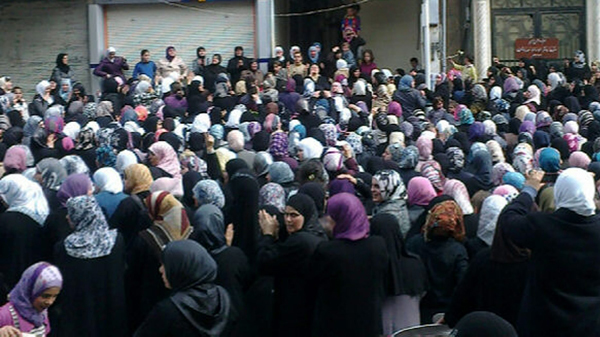News:
On 25th May 2015, it was reported in Pakistani media that a jirga of the local elders and representatives have decided to ban women from voting in different union councils of Tal Tehsil, KPK province, in the local government elections set to be held on Saturday. A council of local elders held in Tal, verbally agreed to ban women from using their right of voting in the elections. Although no written statement was issued, residents of the area were informed of the decision and were asked not to allow their women for polling their votes on the election day. Women are often restricted from voting in the conservative Pakhtun society. Allegedly women were not allowed to vote in the recently held by-polls for a provincial assembly seat PK-95, vacated by Jamaat-e-Islami Pakistan Chief Sirajul Haq in Dir District of KPK. The Women’s Parliamentary Caucus (WPC) reacted by saying that it has taken a serious notice of women being barred from voting in several areas of the Lower Dir PK-95 constituency in Khyber Pakhtunkhwa (KP) during the recently held by-election. MNA Shaista Pervaiz Malik, the WPC Secretary, has condemned the denial of women’s right to vote during the election where the two major candidates belonged to the Jamaat-e-Islami (JI) and Awami National Party (ANP).
Comment:
Although the percentage of women parliamentarians in Pakistan has increased over the years, as after the election of May 2013 the percentage of women in Lower House has reached 20.7% and in the Upper House this percentage is now 18% according to the data compiled by the Inter-Parliamentary Union on the basis of information provided by National Parliaments by 1st May 2015.( http://www.ipu.org/wmn-e/classif.htm). However, women are still considered to be marginalized and discredited in the field of politics. They are not allowed to vote and in many cases do not hold their independent view about electing a candidate, rather they are influenced by the opinions of their male relatives. The politics under the democratic system is based on personal benefits and monetary gains, which the candidates wish to achieve as much as possible, on the expense of general public. They contest the elections, spending tens of millions to earn billions when they are elected, through the development funds they are given to supposedly spend on the progress of their respective areas. They do not take part in elections with the aim to take care of the affairs of people, as the politics under secular and liberal Capitalism means defrauding, deceiving and fooling the general public by any means possible. In this kind of political environment, the women and men taking part in politics are akin in making no difference in the current abhor able economic and socio-political circumstances. Women parliamentarians have therefore not been able to improve the condition of women all across the globe, which face hunger, poverty, lack of clean water, health and education facilities. What difference then the participation of women voters will make in elections under the same rotten Capitalist system and Democracy?
On the contrary, the Islamic definition of politics is taking care of the affairs of Ummah or public. Under the Islamic system of Khilafah, the women participated in all affairs of Ummah with free will, rather it was obligatory upon them to account the Khalifah, walis (governors) and other persons on ruling posts. This was because Allah سبحانه وتعالى said:
كُنتُمۡ خَيۡرَ أُمَّةٍ أُخۡرِجَتۡ لِلنَّاسِ تَأۡمُرُونَ بِٱلۡمَعۡرُوفِ وَتَنۡهَوۡنَ عَنِ ٱلۡمُنڪَرِ وَتُؤۡمِنُونَ بِٱللَّهِ
“You are the best of the nation raised up for mankind because you enjoin what is right and forbid the wrong and believe in Allah”
(Ale-Imran: 110)
Women in the Khilafah system were consulted by the rulers in important affairs and they participated in election of Khalifah alongside men. Umar (ra), the second head of Khilafah after the death of Prophet Muhammad ﷺ, convened a group to determine his successor. One of the group, Abdul Rahman (ra), went to the people to consult with them as to who should be the next leader. So he consulted both women and men, thus women had a say in who would be their next Khlaifah. The people’s customs and traditions regarding the women in Arab society were disregarded because the law of Allah سبحانه وتعالى was completely and comprehensively implemented under the Islamic state of Khilafah. This is not the case under Capitalism and democracy, where the will of men supersedes the laws of Allah, therefore the jirga was able to stop women from even participating in a futile election. Accordingly, the full participation of women in the political arena is only possible under the Divine system of Khilafah, where Allah’s laws cannot be suspended in any case and are completely implemented. Moreover, under this state of Khilafah, the men and women participating in elections for the Majlis al Ummah, will not do it for the sake of getting more power or making money, as there will be no incentive like this. The only incentive for them would be to raise the issues of the people in their respective constituencies and account the Khalifah i.e. to take care of the affairs of public. That would make the real change and improve the conditions of Ummah in all the fields. Consequently, the women of Pakistan should strive to establish the Khilafah Rashidah the second on the footprints of Prophet ﷺ that would truly liberate them. Allah سبحانه وتعالى says:
يَـٰٓأَيُّہَا ٱلَّذِينَ ءَامَنُواْ ٱسۡتَجِيبُواْ لِلَّهِ وَلِلرَّسُولِ إِذَا دَعَاكُمۡ لِمَا يُحۡيِيڪُمۡۖ وَٱعۡلَمُوٓاْ أَنَّ ٱللَّهَ يَحُولُ بَيۡنَ ٱلۡمَرۡءِ وَقَلۡبِهِۦ وَأَنَّهُ ۥۤ إِلَيۡهِ تُحۡشَرُونَ
“O you, who believe! Give your response to Allah and His Messenger, when He calls you to that which will give you life; and know that Allah intervenes between a man and his heart, and that it is He to whom you shall (all) be gathered.”
(Al-Anfal: 24)
Written for Central Media Office Hizb ut Tahrir by
Ammara Tahir

